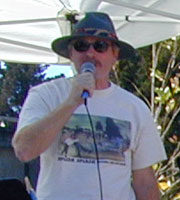LATE-BREAKING UPDATE: Contact information for volunteers has changed. To volunteer for a two-hour (or longer) shift, please contact Seven Generations at 530-2522. Clean winter clothing may also be donated on the morning of the event. For more information, please see a brief Oakland Tribune article published November 10.
In Oakland’s Grand Lake Neighborhood, homeless individuals are a regular presence—sometimes requiring shoppers on Grand and Lakeshore to run a gantlet of panhandlers with extended hands. These are people largely at the mercy of psychoses, drug and alcohol addiction, ill health and circumstances beyond their control.
The Grand Lake District is not unique in this regard. The homeless have been reported in locations as isolated as Dimond Park and Chabot Canyon. And our problems pale alongside those experienced downtown and along the estuary where the City and CalTrans periodically dismantle large homeless encampments.
As intractable as this situation may appear, there are some reasons for optimism. For starters, your tax dollars already underwrite services provided by the Departments of Human Services in Oakland and Alameda County. In addition, State Proposition 63, which voters approved in 2004, will very shortly begin to provide funds for outreach workers and for thirty units of supervised housing for the mentally ill men and women who make up roughly 25% of Oakland’s homeless population. Unfortunately, those thirty units represent a drop in the bucket when you consider that the number of hard-core homeless in Oakland alone is estimated at 1,400 and some view that as a conservative estimate.
The single biggest source of encouragement is, however, the emergence of Project Homeless Connect , the program that San Francisco pioneered in 2004 under the stewardship of Mayor Gavin Newsom. San Francisco has had remarkable success in garnering support from thousands of volunteers along with donations from the corporate and business community. As a result, every two months, San Francisco’s homeless community is availing itself of free medical care, eyeglasses, hot meals, housing and job referrals, warm clothing, etc. In addition to the immediate impact on San Francisco’s homeless population, their efforts have inspired similar programs in 32 cities nationwide.
One of those cities is Oakland, which held its first Project Homeless Connect event in November of last year in the parking lot of the Oakland Auditorium. About one hundred clients showed up, as did some forty volunteers. Those numbers increased dramatically in April when about two hundred volunteers turned out to act as “buddies,” escorting clients to the forty plus agencies and services represented at the event which was hosted by St. Vincent de Paul. As reported by Henry K. Lee in the San Francisco Chronicle, those services included massages—not to mention haircuts and emergency tooth extractions.
The next event here in Oakland is scheduled for Monday, November 13, and will be centered at the Howie Harp Center on the corner of 18th and San Pablo. It will coincide with the opening of the city’s 100-bed winter shelter that afternoon. Volunteers and donations (including winter coats) are once again very much needed. I’ve been a community volunteer at both of the previous events and recommend the experience highly as a rewarding—though certainly sobering experience. The best part, for me, is in providing such tangible benefits to the homeless population when we, as individuals, are typically powerless to do so.
If you want to help out as a volunteer or make a donation, you can contact Contact LaTasha Howard at (510) 238-3964 or Mike Church at (510) 238-6590 or mchurch@oaklandnet.com. For more information, you can also download their outreach flyer.
As a final aside, I would note that while the Oakland Homeless Connect program is a valuable resource, it doesn’t compare with the one in San Francisco in terms of frequency, scope or resources. A big part of that is that San Francisco’s homeless population is substantially larger and more centrally located in the downtown core. Since it significantly impacts SF business and tourism, there is undoubtedly a greater motivation to affect meaningful changes.
The most significant difference between the sister cities is, however, a lack of political muscle here in Oakland. Jerry Brown, who attended neither of the first two Homeless Connect events here in Oakland, is clearly not Gavin Newsom. Until this month, when the Mayor’s office released a letter to potential resource providers, Brown had in fact had been totally uninvolved. As a consequence, the organizers of the November 13 event are limping along on a meager $10,000 budget without adequate staffing or a suitable indoor location. With Mayor Dellums assuming office early next year, I’ve got my fingers crossed that services to the homeless will assume a higher priority.






Comments
No comments for this post yet…